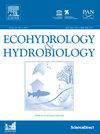Spatiotemporal responses of ecosystem service values to land use/cover changes in the Baiyangdian region, China
IF 2.2
4区 环境科学与生态学
Q2 ECOLOGY
引用次数: 0
Abstract
Intense human activities have altered the land use/land cover (LULC) patterns of lake basins, posing a major challenge to ecosystem sustainability. However, the impacts of land use/cover changes (LUCCs) on ecosystem service value (ESV) of lake basins remain unclear. Here, we investigated ESV of the Baiyangdian (BYD) region from 1980 to 2020 based on value equivalent method, assessed spatial differences of ESVs using hot/cold-spot mapping method, and explored the impact of LUCCs on ESVs in combination with elasticity coefficients. The results showed that (1) the study area was dominated by marsh (50.53 %), water bodies (21.84 %) and cropland (20.28 %) in 2020. Marsh, forestland and grassland significantly decreased from 1980 to 2010, and cropland rapidly rose reaching a peak. Marsh, grassland and water bodies increased during 2010–2020, while cropland decreased. (2) Total ESV was 3469.14 million yuan in 2020, a decrease of 5.77 % compared to 1980 (3681.41 million yuan), mainly due to the decrease in marsh area. (3) ESV hot spots were mainly distributed in the middle part of the region, consistent with water bodies, and ESV cold spots were mainly distributed on the edges of the region, consistent with cropland. The spatial distribution of ESVs varied widely, with an increasing trend. (4) The elasticity coefficients of ESVs to LULC were all greater than 1, indicating that ESVs responded significantly to LUCCs. Overall, there was a strong temporal and spatial correlation between LULC and ESV. This study will provide valuable references for optimizing land use policies and ecological restoration plans and promoting the improvement of ESVs in shallow lakes.
中国白洋淀地区生态系统服务价值对土地利用/覆盖变化的时空响应
激烈的人类活动改变了湖泊流域的土地利用/土地覆被模式(LULC),对生态系统的可持续性构成了重大挑战。然而,土地利用/土地覆被变化(LUCCs)对湖泊流域生态系统服务价值(ESV)的影响仍不清楚。在此,我们基于价值当量法研究了白洋淀地区1980-2020年的生态系统服务价值,利用热点/冷点绘图法评估了生态系统服务价值的空间差异,并结合弹性系数探讨了土地利用/覆盖变化对生态系统服务价值的影响。结果表明:(1) 2020 年,研究区主要为沼泽(50.53%)、水体(21.84%)和耕地(20.28%)。从 1980 年到 2010 年,沼泽、林地和草地明显减少,耕地迅速增加并达到高峰。2010-2020 年间,沼泽、草地和水体增加,而耕地减少。(2)2020 年 ESV 总量为 346 914 万元,与 1980 年(36 8141 万元)相比下降了 5.77%,主要原因是沼泽面积减少。(3)ESV 热点主要分布在区域中部,与水体一致;ESV 冷点主要分布在区域边缘,与耕地一致。ESV 的空间分布差异较大,并呈上升趋势。(4) ESV 对 LULC 的弹性系数均大于 1,表明 ESV 对 LUCC 有显著的响应。总体而言,土地利用、土地利用变化和 ESV 之间存在很强的时空相关性。本研究将为优化土地利用政策和生态修复规划、促进浅水湖泊ESV的改善提供有价值的参考。
本文章由计算机程序翻译,如有差异,请以英文原文为准。
求助全文
约1分钟内获得全文
求助全文
来源期刊

Ecohydrology & Hydrobiology
Agricultural and Biological Sciences-Aquatic Science
CiteScore
5.40
自引率
3.80%
发文量
51
期刊介绍:
Ecohydrology & Hydrobiology is an international journal that aims to advance ecohydrology as the study of the interplay between ecological and hydrological processes from molecular to river basin scales, and to promote its implementation as an integrative management tool to harmonize societal needs with biosphere potential.
 求助内容:
求助内容: 应助结果提醒方式:
应助结果提醒方式:


